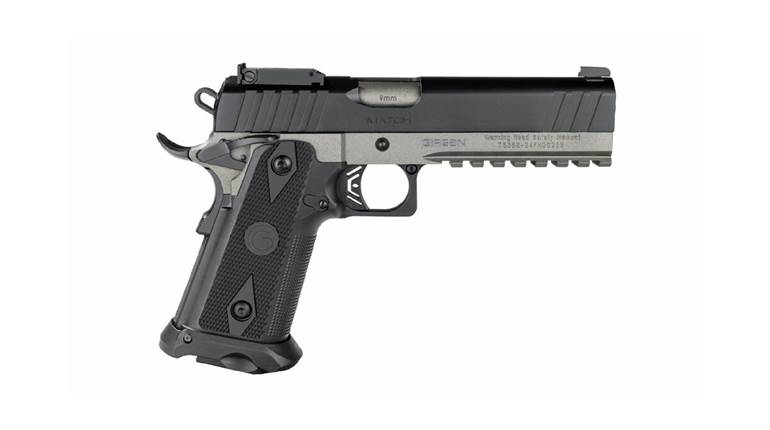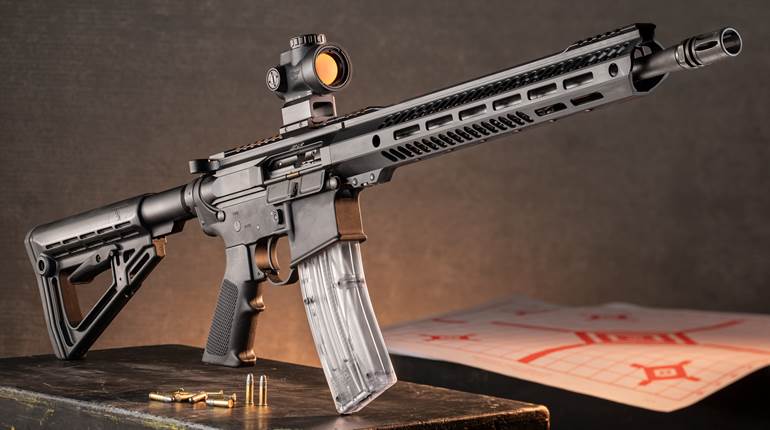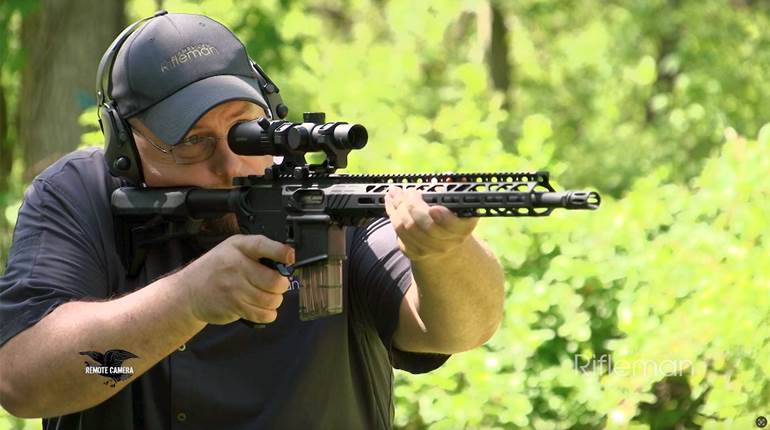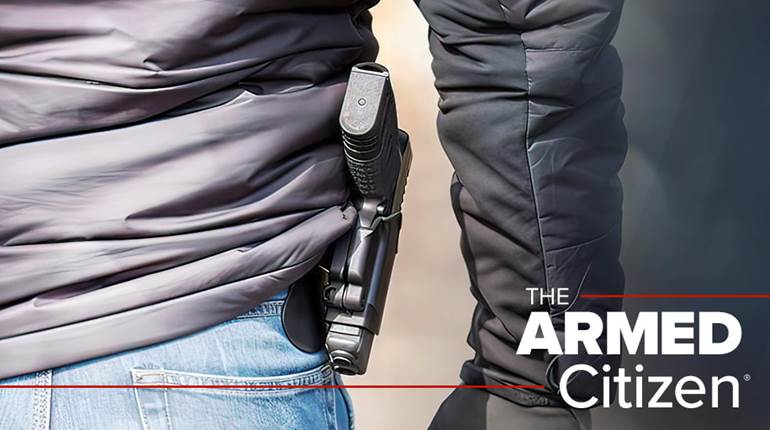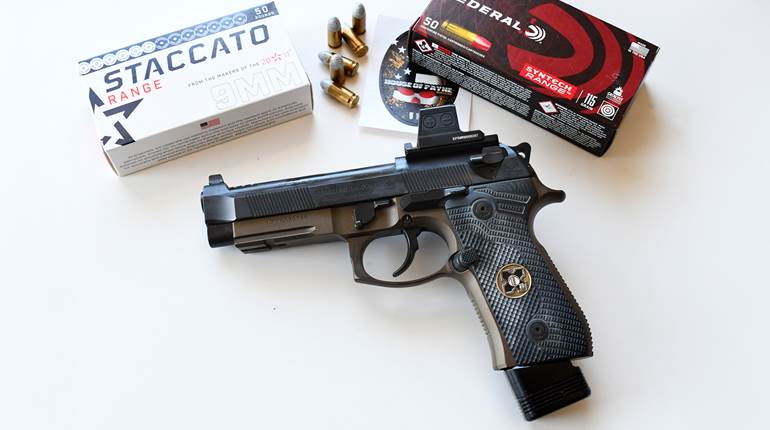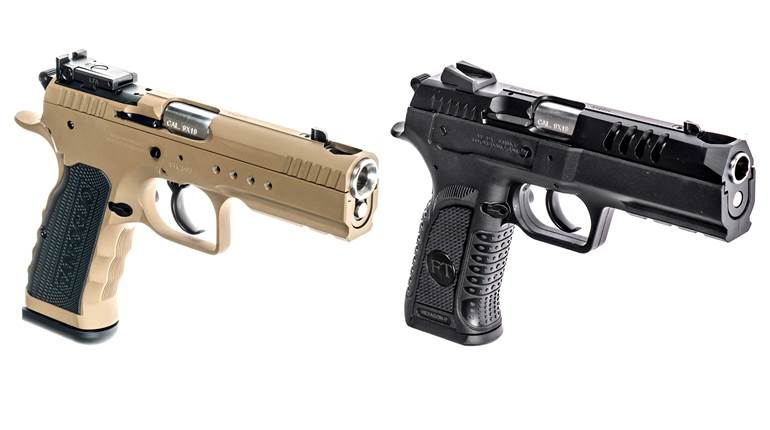
The M14 select-fire battle rifle has enjoyed a rich history of military service since its 1959 debut. Despite the wide adoption of the M16 in the mid 1960s, the M14 continues to serve in all branches of the U.S. military. Well appreciated for its durability, reliability and accuracy, the semi-automatic version of this platform is often found at work in American competition shooting circuits.

One company that has been working diligently for 32 years to keep the gas-piston operated M14 and other vintage service rifles in action is Fulton Armory. I was introduced to this manufacturer through one of its accessories last year while building a .450 Bushmaster pistol. A quick visit to its website revealed that magazine modifications were just the beginning of what this manufacturer has to offer.

Earlier this year I enjoyed a conversation with the Fulton Armory staff, where I learned more about the complete hand-built rifles and custom components the company offers. Catalog options include the M1 Carbine, M1 Garand, M14, and in-house FAR-308 and 223/5.56 AR pattern rifles. This small operation is run by a total of six employees who bench each rifle, one at a time, starting work when a customer’s order. All of the work is completed in-house without any labor being outsourced. Fulton Armory is a buyer-direct operation with no middle men or dealers. It’s about as close to a neighborhood bakery way of doing business as you can get in the shooting industry these days.
Fulton was the first company to offer an M14 chambered in 6.5 Creedmoor before its fairly recent meteoric rise in popularity. A glance through this company's catalog reveals plenty of parkerized steel and hardwood stocks for fans of historically accurate long guns. But Fulton Armory also offers modern tactical and competition-grade updates including the finely tuned M65 EBR rifle I worked with for this review.

Fulton Armory will gladly send customers whatever they prefer to work with, from a box of loose parts to a ready-to-shoot rifle. I wanted the educational experience of working on an M14 (I've only handled factory complete rifles in the past) but I'm not equipped for the gunsmithing, grinding and fitting required to start from a box-of-parts level build. That’s why I requested what the company calls an Intermediate Build. The trickiest bits that required machining and careful hand fitting were completed at their shop. The steps that could be conducted on a bench top with hand tools were left for me to do at home.

Originally i planned to write this article as a walkthrough of building a modern M14 with a chassis stock system. However, the Fulton team sent me a copy of "The M14 Complete Assembly Guide", by Walt Kuleck and Clint Mckee (the founder of Fulton Armory), before undertaking the project. After reading the book it was clear that there are just too many variables, gotchas, and differing degrees of gunsmithing required, depending on the components, to fit into an article like this one. So, here's a look at the features of this custom rifle as it came together followed by some quality time at the shooting range.

Like other rifle and handgun build projects, assembling an M14 will go much more smoothly when a few specialized tools are included with the components order. The M14 Flash Suppressor Nut Pliers (Left) pay for themselves with a single use for what would otherwise be an arduous task. The M14/M1 Garand Bolt Disassembly Tool (Center) is another handy headache reducer. The Sage Marines Multi-Tool (Right) is a platform-specific tool set which handles several important tasks without having to hunt down various screw drivers, hex keys and sockets.

This M65 EBR rifle build kit arrived with the barrel fitted into the receiver at the factory with the important head spacing work completed. The serial numbered receiver is technically considered by the federal government to be the “firearm,” much like the lower receivers for AR-15 and AK pattern platforms. Therefore, the receiver, whether it's stripped, barreled (like this one) or part of a complete firearm, must be transferred through an FFL dealer. All of the other components (stock, trigger, magazines, etc.) can be shipped directly to your home or business without an FFL.

Fulton Armory's mil-spec 8620 steel M14 receiver is heat treated, meets USGI specifications and has a manganese phosphate finish just like the other carbon steel components. Along with the barrel, the rotating bolt assembly and bolt catch were also installed at the factory.

The stainless steel barrel, which is also available in a CM steel (parkerized) version, is Fulton Armory's 22" National Match medium contour version chambered in 6.5 Creedmoor with a 1:8" twist rate. It’s threaded in two locations, including the muzzle for the front sight assembly, and in between the muzzle and the operation rod guide where the gas piston housing attaches.

This rifle was upgraded with Fulton's Performance Package which includes a Sadlak Industries national match quality precision piston. Manufactured using premium-grade, heat-treated and highly polished 420 stainless steel, the piston is hard coated with a gold colored Titanium Nitride (TiN) finish to reduce galling and pitting. The result is a smoother action and an improved working life span for the piston and cylinder. All of the other stainless steel gas system parts treated with a black oxide finish.
You can see the gold colored piston protruding from the rear of the mil-spec gas cylinder once the cylinder, lock and plug are all installed. Because there is no front band on this rifle (the band is used with a wood stock) a set of spacing shims are installed between the barrel and the second support ring of the gas cylinder to ensure proper spacing and secure the cylinder.

The steel M14/M1A front sight assembly incorporates a dovetailed front sight blade, a 3" long National Match flash suppressor and a bayonet lug.

The M14 rear sight assembly sports a mil-spec aperture which can be click adjusted for height and windage using the left and right adjustment knobs. Just in front of the rear sight is a dovetailed support. A vintage stripper clip guide is usually installed in this dovetail for historical replica rifles. In this case, the dovetail will be reserved to support the scope mount.

The connector lock pin is installed on the underside of the receiver and secured with a roll pin. This is where the rear of the operation rod's spring guide (i.e. recoil assembly) connects to the receiver.

The operation rod transfers the reward impulse of the gas piston to the bolt assembly. It also serves to manually cycle the bolt with a reciprocating handle located on the right side just below the ejection port.

The recoil assembly consists of a Sadlak NM spring guide rod (part of the Performance Package) and a single round-wire spring, both of which fit into the operation rod.

With the iron sights, gas cylinder assembly, bolt and operation rod assembly installed, the barreled action (Top) is ready to be installed in the chassis system (Middle). The trigger group (Bottom) is used to latch and secure the receiver to the chassis.

The factory standard milled aircraft-grade aluminum chassis for the M65 is the Sage International EMR system with a telescoping shoulder stock. In this case, the rifle was upgraded to the Sage EBR configuration, which is available in a black finish.
The EBR's ventilated fixed shoulder stock extension is outfitted with a modified Magpul PRS II stock. Aluminum click adjustment knobs allow the polymer cheek riser to be elevated up to 1.5" and the rubberized butt plate to be extended up to 1". An aluminum two-point sling attachment bar is located on the left side of the shoulder stock with its mate located on the handguard. Ambidextrous single-point sling loops are located just above the comfortable, removable rubberized Ergo Grips AR-15 pistol grip.

The removable full-length top rail section of the ventilated aluminum handguard is secured to the chassis with a total of 5 hex-head screws. As one might expect, this rail must be removed from the chassis in order to install the barreled receiver assembly.

In addition to the 10" worth of Picatinny rail on top of the handguard, three removable 3.75" accessory rails are located at the 3-, 6-, and 9-o'clock positions for attaching lights, lasers and other upgrades. In this case, the 6-o'clock rail was used to support the excellent tip-adjustable Harris S-BR bipod outfitted with an ARMS #32 QD rail mount that was included with this particular rifle package. Just behind the accessory rails the handguard is wrapped with a Kydex sleeve which provides a comfortable, non-abrasive gripping surface for the support hand.
The standard magazine release, located in front of the trigger guard, was traded out for a Sadlak Industries extended upgrade. This rifle ships with one Check-Mate Industries M14/M1A 10-round magazine. Two additional Check-Mate 20-round magazines were included for the range test.

The factory complete M14/M1A USGI National Match trigger group was ready to slide into the receiver and snap into place when the trigger guard was closed. The safety lever is located in the front of the trigger guard so as to be operated with the tip of the trigger finger. A hole drilled through the safety lever allows it to be secured with a small padlock in order to keep the gun from being fired by unauthorized individuals. The plain-faced steel bow trigger exhibited a smooth, a two-stage trigger pull which broke cleanly with 5 lbs. 5 oz. of trigger pull.

Fulton Armory's milled steel 5.5" Picatinny M14 optics mount is about as rock solid as they come. The rear of the height-adjustable mount is secured into the dovetailed support in front of the rear sight. The left side is secured to the receiver via a tension adjustable bolt. At the front of the mount is a tension screw which contacts the top of the receiver. For all informal and formal testing, the rifle was topped off with Bushnell's top-quality Elite Tactical XRS II-i 4.5-30X50 mm long-range scope using a set of Weaver Tactical 34 mm High 6-Hole rings.

Here's the finished M65 as it was put through its paces at the unique TNT Guns & Range subterranean 100-yard shooting range, which has a distinct advantage over outdoor testing: no wind to blow your shots off course.

Assembling the rifle from a kit allowed me to see firsthand the high quality fit, finish and function of this match-grade platform. The complete absence of any gun, magazine or ammunition related malfunctions in the course of informal and formal testing was a real plus as well. Fully outfitted with the optic, bipod, 20-round magazine and 20 rounds of ammunition, this rig tips the scales at just under 18.5 lbs. While I wouldn't want to hike up and down mountainsides with this rifle on a hunt, it proved to be one of the most comfortable center-fire rifles I have yet to work with from a bench rest. The 6.5 Creedmoor is lauded for its long-range accuracy and moderate levels of felt recoil. When fired from this version of the M65, the felt recoil with all of the loads tested was downright tame, verging on mild, making it an all-day comfortable to shoot set-up.
The Fulton Armory team let me know up front that this rifle's operational performance is at its best when fired with 6.5 Creedmoor loads topped with 140-gr. bullets. The company offers a Precision Guarantee of group sizes under 1.5 MOA (about 1.57" at 100 yards) when shooting Hornady match-grade ammunition. I put this guarantee to the test with a Federal Premium hunting load, one of Hornady’s multi-purpose/practice loads and a Hornady match load by firing five 5-shot groups at 100 yards using the provided bipod to stabilize the rifle at the front and a sand bag at the rear.
Federal Premium's 135-gr. open-tip Berger Hybrid Hunter tapped out a best single 5-shot group of 1.38" with a five-group average of 1.50". Hornady's more affordably priced American Gunner 140-gr. boat-tail hollow point yielded a best group of 1.23" with an average of 1.38". But it was Hornady's Match 147-gr. polymer-tipped ELD Match that took home the gold for accuracy. It printed a best group of 0.82" with an average of 0.97".

Fulton Armory's M65 match-grade interpretation of the M14 semi-automatic rifle is one classy shooting machine! Chambered in 6.5 Creedmoor, it provided one of the most enjoyable bench-rested, center-fire shooting experiences I have yet to experience. I've had a great time getting to know the M14 platform inside and out thanks to the information and kit provided by this company.
In addition to this rifle's top-notch performance and history, customers receive the Fulton Armory’s excellent customer service and gunsmithing experience. If you are looking for a bargain basement plinker, then this isn't the company for you. However, if you're in the market for a hand-crafted, high-quality competition rifle, vintage combat platform or a challenging do-it-yourself project, then Fulton Armory has just what you’re looking for.
 Specifications:
Specifications:
Manufacturer: Fulton Armory
Model: M65 EBR Rifle
Action: M14 Gas-Piston Operated Semi-Automatic with Rotating Bolt
Caliber: 6.5 Creedmoor
Receiver: Fulton Armory USGI Specification Heat-Treated 8620 Steel
Receiver Finish: Manganese Phosphated Finish, Matte Black
Internal Components: G.I. and True Mil-Spec Parts Throughout
Bolt Assembly: F.A. Forged Gen II
Op. Rod Guide: Sadlak Industries NM
Gas Piston: Sadlak Industries TiN NM
Barrel: Fulton Armory 22" National Match, Stainless Steel, Medium Contour
Front Sight Assembly: M14/M1A with National Match Flash Suppressor and Bayonet Lug
Rear Sight: M14/M1A Aperture
Scope Mount: Fulton Armory All-Steel M1913 Picatinny Rail, Height Adjustable
Chassis System: Sage International Tactical Chassis, PMRI with Magpul PRS2 Buttstock
Handguard: M1913 Picatinny Quad-Rail
Buttstock: Fixed, Adjustable Cheek Riser, Adjustable Recoil Pad
Cheek Riser Adjustment: 1.5"
Recoil Pad Adjustment: 1"
Pistol Grip: Ergo Grip Removable AR-15, Rubberized with Finger Grooves
Bipod: Harris Bipods S-BR with ARMS #32 QD Bipod Rail Mount
Trigger: Complete M14/M1A USGI National Match
Trigger Pull: 5 lbs. 5 oz. (As Tested)
Magazine Catch: Sadlak Industries Extended
Magazine: Check-Mate Industries M14/M1A 10-Round Magazine (FA-A257-M)
Capacity: 10- or 20-Round Removable Box Magazines
Overall Length: 44.25"- 45.25"
Length of Pull (LOP): 13.5" - 14.5"
Weight: 14-lbs. 2.8-oz. with Bipod and Empty 10-round Magazine
Twist: 1:8” RH
Rifle Grooves: 6
Accessories: One 10-Round Magazine, Black Nylon Sling, Owner’s Manual
Rifle Package Suggested Retail: $4,332.70
Check-Mate USGI Issue M14/M1A 20-Round Magazine (FA-A258-M) $29.95
Sage Marines Multi-Tool for M39, EMR, M14 (FA-A456-M) $149.95
Bolt Disassembly Tool, M14/M1 Garand (FA-A142-GM) $69.95
M14 Flash Suppressor Nut Pliers (FA-A201-M) $29.95
Optic: Bushnell Tactical XRS II-i 4.5-30X 50 mm (ET46305GI) $3,289.95
Scope Mount: Weaver Tactical 34 mm High 6-Hole Picatinny Rings (99684) $109.95














